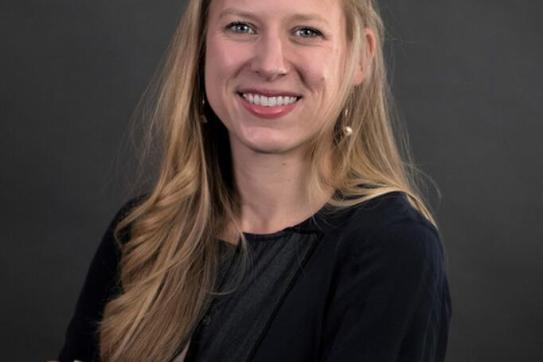As the world responds to the COVID-19 outbreak, The Bernstein Center is taking a step back to pause and reflect on our “new normal.” Each week, the Bernstein Center is speaking with a member of the Columbia Business School community in order to offer various voices and snippets of introspection during this unprecedented time.
As a precursor to Leadership and Ethics Week 2020, which is hosted by the Student Leadership and Ethics Board (SLEB), the Bernstein Center virtually chatted with Anna Houseman '21, who was recently appointed SLEB co-chair for the upcoming academic year. Anna is currently in Atlanta, where she is social distancing with her family.
Read on for a few moments of inspiration and humanity as we face this surreal situation together.
BERNSTEIN: How are you staying focused and productive in this time of uncertainty?
ANNA: For all of us, the past few weeks have created a “new normal,” challenging our sense of purpose and triggering many emotions. I spent the first three weeks feeling sad, anxious, lethargic, and overwhelmed by the magnitude of everything going on, but I’ve finally gotten into a rhythm and feel refocused and productive again.
I’m used to being quite active, so, to keep my routine, I build in multiple online HIIT workouts throughout the day, and I’m not letting myself sleep in. I’ve taken on a volunteer consulting project for a local nonprofit while completing a nonprofit management course online at Kellogg and participating in CBS-sponsored webinars.
The more I can connect my daily work to the crisis, the more focused I feel. In my Design for Social Innovation class, my team and I have been working on a consulting project since January with the Harlem Children’s Zone (HCZ) to help them increase engagement within the central Harlem community. In response to COVID-19, HCZ is distributing food and masks to families within the Zone. Now, my team and I are pivoting our project to create tools and resources that help HCZ maximize the number of individuals they can contact and support. Knowing our work is immediately impacting lives gives me the focus and urgency needed to be productive throughout the day.
BERNSTEIN: What is causing you stress or anxiety and how are you dealing with it?
ANNA: My heart has felt unbelievably heavy over the past few weeks as I’ve watched so many people struggle. I can’t stop thinking about the medical professionals risking their lives, the sick and dying, the homeless who have no place to go, the children who are no longer in school, and the unemployed or furloughed. I’m a “doer” and a fighter, and I feel helpless right now.
In addition to social distancing and giving money, I’m trying to act in the ways I know how—I’m the Associate Board Co-chair of a local mission, and we’re spearheading a virtual fundraiser to keep the food pantry open; I’ve signed up to tutor children; and I’m calling friends and family who I know are alone. But it never feels like I’m doing enough.
I’m dealing with this anxiety by clinging to the stories I hear that depict the goodness of humanity—CEOs giving up salaries, companies pivoting to make PPE, New Yorkers cheering for the healthcare workers each night at 7pm, my mom cooking meals for shelters, and my mother-in-law sewing masks. I’m reminded this is a team effort, and each little action creates hope for a struggling world.
"I'm tying to act in the ways I know how ... But it never feels like I'm doing enough."
BERNSTEIN: What is something new you have tried in the past few weeks while practicing social distancing?
ANNA: Pilates! My muscles have been going crazy sitting for so long each day! (I still can’t touch my toes, but I’m making progress.) I also just ordered adult coloring books to use during Zoom classes to help me focus (I’m not loving staring at a computer screen all day!).
BERNSTEIN: How have your personal ethics been tested during this time of crisis?
ANNA: My personal ethics are tested daily right now. I live in the Financial District, and I vividly remember going for walk a few weeks ago in Battery Park. The only people I saw in front of the Staten Island Ferry were homeless, and I quickly realized that social distancing is a tremendous privilege. I can sit in the comfort of my home, have food delivered, and get medical care if I need it. Too many people can’t, and that’s not ok.
As a former elementary and middle school teacher, I’m also infuriated by the technological inequity in our school systems. Some schools have the resources to provide computers and Internet to all their students; yet other schools, especially in lower income areas, have simply cancelled school and given “optional work packets” to students. These students may never make up the learning they’re missing right now. Again, it’s not ok.
Finally, I’ve wrestled with the decisions that leaders have had to make. Closing schools means many children don’t have food or a safe environment each day, but it slowed the spread of COVID-19. Closing non-essential businesses put so many out of work, but, again, it slowed the spread. New health protocols in New York City limit who can be taken to the hospital after a heart attack to free up more hospital space and resources. In the wake of this crisis, our leaders have had to make choices over and over again between saving the individual or protecting the masses. These are ethical decisions I hope I never have to make.
While my personal ethics have been challenged throughout this crisis, I have never felt more inspired to fight for the inequities revealed by COVID-19. As a country, we have come a long way closing education achievement and socioeconomic gaps, but this crisis has shown that we still have a long way to go.
